- Home
- Elizabeth E. Wein
The Pearl Thief
The Pearl Thief Read online
For Helen
Time and change shall not avail
to break the friendships formed
CONTENTS
PART 1: WHAT HAPPENED 15TH–28TH JUNE 1938
1. AN ASSORTMENT OF THINGS GONE MISSING
2. NO MODESTY AT ALL
3. LES LIAISONS DANGEREUSES
4. MY JANGLED BRAIN AND THE YELLOW DOG
5. WHAT’S YOUR PROPER WORK?
6. FINDING OUT WHAT A PRECOGNITION IS
PART 2: WHAT HAPPENED 11TH–23RD JULY 1938
7. WE DON’T KEN HALF WHAT’S BURIED IN THE PEAT
8. RATHER A LOT OF GIVING AND TAKING
9. THE APPEARANCE OF LEGS
10. LYING ABOUT ONE’S AGE CAN BE A FORM OF ART
11. HOW A LAD GIVES A KISS WHEN HE MEANS IT
12. ENOUGH TO PAY FOR A ’PHONE CALL
PART 3: WHAT HAPPENED 24TH JULY–17TH AUGUST 1938
13. SEVERAL THINGS I CAN’T HAVE
14. THOSE ARE PEARLS THAT WERE HIS EYES
15. EATING PEOPLE UP
16. AN’ WHA DARE MEDDLE WI’ ME?
17. THE GLORIOUS TWELFTH
18. AS FAIR ART THOU, MY BONNIE LASS
AUTHOR’S NOTE
QUESTIONS FOR DISCUSSION
O, my love’s like a red, red rose,
that’s newly sprung in June;
O, my love’s like the melody
that’s sweetly play’d in tune.
As fair art thou, my bonnie lass,
so deep in love am I,
and I will love thee still, my dear,
till a’ the seas gang dry.
Till a’ the seas gang dry, my dear,
and the rocks melt wi’ the sun:
I will love thee still, my dear,
while the sands o’ life shall run.
And fare thee well, my only love!
And fare thee well awhile!
And I will come again, my love,
tho’ it were ten thousand mile.
Robert Burns, ‘A Red, Red Rose’
WHAT HAPPENED
15TH–28TH JUNE 1938
1
AN ASSORTMENT OF THINGS GONE MISSING
‘You’re a brave lassie.’
That’s what my grandfather told me as he gave me his shotgun.
‘Stand fast and guard me,’ he instructed. ‘If this fellow tries to fight, you give him another dose.’
Grandad turned back to the moaning man he’d just wounded. The villain was lying half-sunk in the mud on the edge of the riverbank, clutching his leg where a cartridge-ful of lead pellets had emptied into his thigh. It was a late summer evening, my last with Grandad before I went off to boarding school for the first time, and we’d not expected to shoot anything bigger than a rabbit. But here I was aiming a shotgun at a living man while Grandad waded into the burn, which is what we called the River Fearn where it flowed through his estate, so he could tie the evildoer’s hands behind his back with the strap of his shotgun.
‘Rape a burn, would you!’ Grandad railed at him while he worked. ‘I’ve never seen the like! You’ve destroyed that shell bed completely. Two hundred river mussels round about, piled there like a midden heap! And you’ve not found a single pearl, have you? Because you don’t know a pearl mussel from your own backside! You’re like a bank robber that’s never cracked a safe or seen a banknote!’
It was true – the man had torn through dozens of river mussels, methodically splitting the shells open one by one in the hope of finding a rare and beautiful Scottish river pearl. The flat rock at the edge of the riverbank was littered with the broken and dying remains.
Grandad’s shotgun was almost too heavy for me to hold steady. I kept it jammed against my shoulder with increasingly aching arms. I swear by my glorious ancestors, that man was twice Grandad’s size. Of course Grandad was not a very big man – none of us Murrays is very big. And he was in his seventies, even though he wasn’t yet ill. The villain had a pistol – he’d dropped it when he’d been hurt, but it wasn’t out of reach. Without me there to guard Grandad as he bound the other man, they might have ended up in a duel. Brave! I felt like William Wallace, Guardian of Scotland.
The wounded man was both pathetic and vengeful. ‘I’ll see you in Sheriff Court,’ he told my grandfather, whining and groaning. ‘I’m not after salmon and there’s no law against pearl fishing, but it’s illegal to shoot a man.’
Grandad wasn’t scared. ‘This is a private river.’
‘Those tinker folk take pearls here all the time. They come in their tents and bide a week like gypsies, and go away with their pockets full!’
‘No tinker I know would ever rape a burn like this! And they’ve the decency to ask permission on my private land! There’s laws and laws. Respect for a river and its creatures goes unwritten. And the written law says that I can haul you in for poaching on my beat, whether it’s salmon or pearls or anything else.’
‘I didn’t – I wasnae –’
‘Whisht. Never mind what you were doing in the water: you pointed your own gun at my wee granddaughter.’ Grandad now confiscated the pistol that was lying in the mud, and tucked it into his willow-weave fisherman’s creel. ‘That’s excuse enough for me. I’m the Earl of Strathfearn. Whose word will the law take, laddie, yours or mine?’
Grandad owned all of Strathfearn then, and the salmon and trout fishing rights that went with it. It was a perfect little Scottish estate, with a ruined castle and a baronial manor, nestled in woodland just where the River Fearn meets the River Tay. It’s true it’s not illegal for anyone to fish for pearls there, but it’s still private land. You can’t just wade in and destroy someone else’s river. I remember how shocking Grandad’s accusation sounded: Rape a burn, would you!
Was that only three years ago? It feels like Grandad was ill for twice that long. And now he’s been dead for months. And the estate was sold and changed hands even while my poor grandmother was still living in it. Grandad was so alive then. We’d worked together.
‘Steady, lass,’ he’d said, seeing my arms trembling. I held on while Grandad dragged the unfortunate mussel-bed destroyer to his feet and helped him out of the burn and on to the riverbank, trailing forget-me-nots and muck and blood. I flinched out of his way in distaste.
He’d aimed a pistol at me earlier. I’d been ahead of Grandad on the river path and the strange man had snarled at me, ‘One step closer and you’re asking for trouble.’ I’d hesitated, not wanting to turn my back on his gun. But Grandad had taken the law into his own hands and fired first.
Now, as the bound, bleeding prisoner struggled past me so he could pull himself over to the flat rock and rest amid the broken mussel shells, our eyes met for a moment in mutual hatred. I wondered if he really would have shot at me.
‘Now see here,’ Grandad lectured him, getting out his hip flask and allowing the wounded man to take a taste of the Water of Life. ‘See the chimneys rising above the birches at the river’s bend? That’s the County Council’s old library on Inverfearnie Island, and there’s a telephone there. You and I are going to wait here while the lassie goes to ring the police.’ He turned to me. ‘Julie, tell them to send the Water Bailiff out here. He’s the one to deal with a poacher. And then I want you to stay there with the librarian until I come and fetch you. Her name is Mary Kinnaird.’
I gave an internal sigh of relief – not a visible one, because being called ‘brave’ by my grandad was the highest praise I’d ever aspired to, but relief nevertheless. Ringing the police from the Inverfearnie Library was a mission I felt much more capable of completing than shooting a trespasser. I gave Grandad back his shotgun ceremoniously. Then I sprinted for the library, stung by nettles on the river path and streaking my shins with mud. I skidded ove
r the mossy stones on the humpbacked bridge that connects Inverfearnie Island to the east bank of the Fearn, and came to a breathless halt before the stout oak door of the seventeenth-century library building, churning up the gravel of the drive with my canvas shoes as if I were the messenger at the Battle of Marathon.
It was past six and the library was closed. I knew that Mary Kinnaird, the new librarian and custodian who lived there all alone, had only just finished university, but I’d never met her, and it certainly never occurred to me that she wouldn’t be able to hear the bell. When nobody came, not even after I gave a series of pounding kicks to the door, I decided the situation was desperate enough to warrant breaking in and climbing through a window. They were casement windows that opened outward – if I broke a pane near a latch it would be easy to get in. I snatched up a handful of stones from the gravel drive and hurled them hard at one of the leaded windowpanes nearest the ground. The glass smashed explosively, and I could hear the rocks hitting the floor inside like hailstones.
That brought the young librarian running with a shotgun of her own. She threw open the door.
She was bold as a crow. I stared at her openly, not because of the flat, skewed features of her face, but because she was aiming at my head. The library window I’d smashed was public property.
Nothing for it but to plunge in. ‘Miss Kinnaird?’ I panted, out of breath after my marathon. ‘My grandad has caught a poacher and I – I need to use your telephone – to ring the police.’
Her smooth, broad brow crinkled into the tiniest of irritated frowns. She’d sensed the importance of what I’d said, but she hadn’t heard all of it. Now she lowered her gun and I could see that around her neck hung two items essential to her work: a gold mechanical pencil on a slender rope of braided silk, and a peculiar curled brass horn, about the size of a fist, on a thick gold chain. She’d lowered the gun so she could hold the beautiful horn to her ear.
‘Your grandad needs help?’ she said tartly. ‘Speak up, please.’
‘STRATHFEARN HAS CAUGHT A THIEF AND I NEED TO USE YOUR TELEPHONE,’ I bellowed into the ear trumpet.
The poor astonished young woman gasped. ‘Oh! Strathfearn is your grandfather?’
‘Aye, Sandy Murray, Earl of Strathfearn,’ I said with pride.
‘Well, you’d better come in,’ she told me briskly. ‘I’ll ring the police for you.’
I wondered how she managed the telephone if she couldn’t hear, but I didn’t dare to ask.
‘Grandad said to send Sergeant Angus Henderson,’ I said. ‘He’s the Water Bailiff for the Strathfearn Estate. He polices the riverbank.’
‘Oh, aye, I know Angus Henderson.’
She shepherded me past the wood and glass display cases on the ground floor and into her study. But I poked my head around the door to watch her sitting at the telephone in its dark little nook of a cupboard under the winding stairs. I listened as she asked the switchboard operator to put her through to the police station in the village at Brig O’Fearn. There was a sort of Bakelite ear trumpet attached to the telephone receiver. So that answered my question.
I went and sat down in the big red leather reading chair in Mary Kinnaird’s study, feeling rather stunned and exhausted, and after a few minutes she came in with a tray of tea and shortbread.
‘I expect Grandad will pay for your window,’ I told her straight away. I assumed his wealth was limitless, three years ago. I hoped he wouldn’t be angry, and I wondered how he was getting on, waiting alone with the vicious and miserable prisoner. ‘I’m very sorry I had to break the glass.’
‘And I am very sorry I pointed my gun at you.’ Mary knelt on the floor beside me, there being no other chair but the one behind her desk.
She offered the shortbread. I found I was ravenous.
‘Oh, I knew you wouldn’t hurt me,’ I told her. ‘You are too bonny.’
‘You wee sook!’ she scolded. ‘Bonny?’
‘Not beautiful,’ I told her truthfully. ‘Your face is kind. You’re sort of fluttery and quiet, like a pigeon.’
She threw her head back and laughed.
‘Prrrrrt,’ she said in pigeon-talk, and this made me laugh too. Suddenly I liked her very much.
‘What’s your name?’ she asked me.
‘Lady Julia Lindsay MacKenzie Wallace Beaufort-Stuart,’ I reeled off glibly.
‘Oh my, that is quite a name. Must I call you Lady Julia?’
‘Grandad calls me Julie.’
‘I will compromise with Julia. Beaufort and Stuart are both the names of Scottish queens; I can’t quite lower myself to Julie.’ She smiled serenely. ‘Not Murray? Isn’t that your grandfather’s name?’
‘Some of my brothers have Murray as a family name.’
‘You know the Murrays were in favour with Mary Stuart. There’s a bracelet on display in the library that belonged to her when she was a child. She gave it to your grandfather’s people because she was their patron, four hundred years ago.’
‘Scottish river pearls – I know! Grandad showed me when I was little. They’re the only thing I remember about the display cases. All those dull old books along with this beautiful wee bracelet that belonged to Mary Queen of Scots! And I’m related to her on the Stuart side.’
Mary laughed. ‘Those books are first editions of Robert Burns’s poems! I don’t find them dull. But the pearls are everybody’s favourite.’
My hidden criminal inner self noted what an idiot the wounded trespasser was, stripping young mussels from the river when this perfect treasure lay in plain sight of the general public every day.
But perhaps the river seemed easier prey than Mary Kinnaird.
She said to me then, ‘So I’m a Mary and you’re a Stuart. And I have the keys to the case. Would you like to try on Mary Queen of Scots’ pearl bracelet while you wait for your grandad to come back for you?’
Mary Kinnaird suddenly became my favourite person in the entire world.
I noticed something. ‘How can you hear me without your trumpet?’
‘I’m watching your mouth move. It helps a great deal to see your mouth straight on. I don’t like the trumpet much.’
‘The trumpet is splendid.’
She twisted her mouth again. It wasn’t a smile. ‘But the trumpet makes me different from everyone else. And I am already a bit different.’
‘No one’s exactly alike,’ I said blithely. ‘I can find my mother in a candlelit hall full of dancers by the scent she wears. Everybody’s different.’
It was very easy for me to say, flush with the fear and triumph of my last summer afternoon with my grandfather, the Earl of Strathfearn. I was safe now, eating shortbread in the Inverfearnie Library, and looking forward to trying on pearls that had once been worn by Mary Queen of Scots. Everybody’s different: it was easy for me to say.
*
‘You’re a brave lassie!’
It was a perfect echo of Grandad, but of course now it wasn’t Grandad and there wasn’t a life at stake. It was only the taxi driver congratulating me.
‘A lass like you, taking the train alone across Europe! Times have changed.’
‘I had my own berth on the Night Ferry,’ I told him modestly. ‘Men and women are separated.’
I didn’t tell him I was coming home from my Swiss boarding school for the summer holidays – I’d spent the entire trip carefully trying to disguise myself as being closer to twenty than to sixteen. I’d put my hair up in a chignon and hidden my ridiculously babyish panama school hat in a big paper bag. With my childish socks and school blazer crammed into my overnight case and the collar of my blouse undone, and the help of a lipstick bought in the rail station in Paris, I thought I pulled off a believable imitation of someone old enough to have left school.
‘But I did arrange the journey myself,’ I couldn’t help boasting. ‘My people aren’t expecting me for another three days. It may be my own fault I’ve lost my luggage though. I think it is having its own little secret holiday in a hidden
corner of the port at Dunkirk.’
The taxi driver laughed. Now we were on the Perth Road on our way to Strathfearn House. Nearly there – nearly! Scotland, summer, the river, Grandad …
And then that moment when I realised all over again that Grandad was gone forever, and this was the last summer at Strathfearn.
‘My grandfather died earlier this year and my grandmother’s selling their house,’ I told the taxi driver. ‘My mother and I are going to help her with the packing up.’
‘Oh, aye, Strathfearn House – he was a good man, Sandy Murray, Earl of Strathfearn. I saw in the Perth Mercury that the Glenfearn School bought the estate. They’ve been working like Trojans to get the house and grounds ready for the students to move in next term. Lucky lads! Your grandad had a nine-hole golf course out there, didn’t he? Good deal of debt though …’
Bother the Mercury. I hoped they hadn’t published an amount, although I supposed they must have printed some number when the estate went up for sale, including the house and everything in it that my grandmother hadn’t brought with her from France in 1885. She must have been so ashamed. Grandad left tens of thousands of pounds’ worth of debt. Originally he lost a great deal of money when the stock market collapsed in 1929, but then he added to it by borrowing to put a new roof on Strathfearn House; then he’d had to sell parts of the estate to pay back the loan; and then he’d been struck with bone cancer. And the treatment, and the visits to specialists in Europe and America, and the alterations to the house so he could go on living in it, and the private nurses …
And suddenly I was longing to be at Strathfearn, even if it wasn’t ours any more; longing to see my mother and grandmother and my friend Mary Kinnaird, longing for one last summer of childish freedom on the River Fearn; but also full of grown-up excitement about being included as someone sensible enough to help settle the Murray Estate, when any one of my five big brothers could have done it. I didn’t want the summer to begin. I didn’t want it to end.
The taxi could not go right up to the house because a digger and a steamroller were engaged in widening the drive. I had to put the fare on my mother’s account, but the driver just laughed and said he knew where to find us. I got out to walk the last third of a mile.

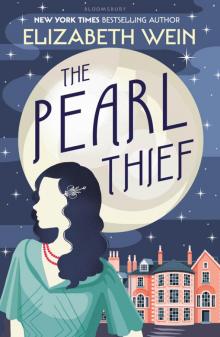 The Pearl Thief
The Pearl Thief Cobalt Squadron
Cobalt Squadron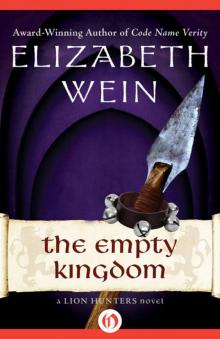 The Empty Kingdom
The Empty Kingdom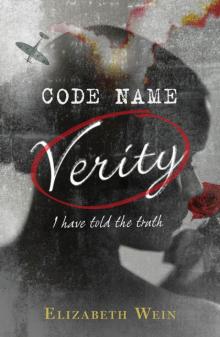 Code Name Verity
Code Name Verity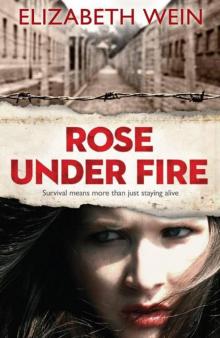 Rose Under Fire
Rose Under Fire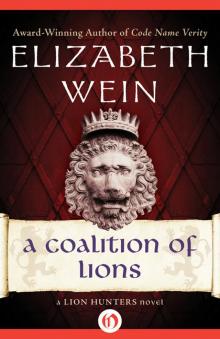 A Coalition of Lions
A Coalition of Lions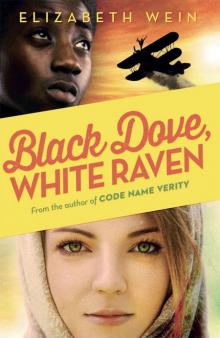 Black Dove, White Raven
Black Dove, White Raven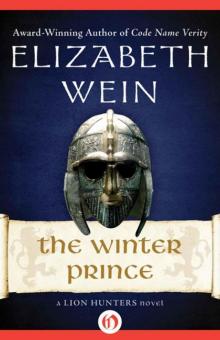 The Winter Prince
The Winter Prince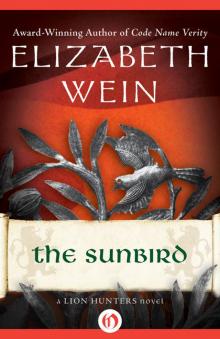 The Sunbird
The Sunbird